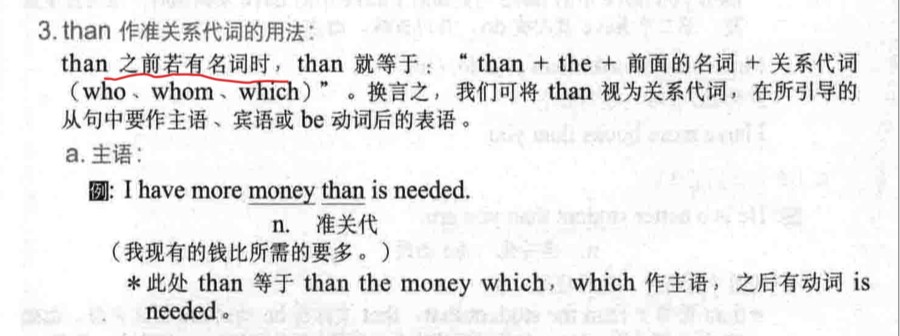关于than在比较结构中的用法
赖世雄书中,说than前面有名词时,than作准关系代词:
I have more money than is needed.
=I have more money than the money which is needed.

我想,还原后的句子中的than应该就是介词了吧。并且我还想知道,如果than前面没有跟名词,是否还能像这样还原?比如说:
I run faster than he runs.
= I run faster than the speed in which he runs.
= I run faster compared with the speed in which he runs.
能否这样还原呢?如果可以的话,那是不是说所有由than引导的比较结构都可以还原成一个由than所引导的介词短语?
请先 登录 后评论
最佳答案 2022-02-28 11:25
赖世雄讲的仅是通常的情况,但不是绝对的,如:1. No more officials are employed than are necessary. 2. More meetings are held than are needed. 另外,than作为准关系代词(这也是《牛津英语用法》的作者M.Swan的观点),但than后面所接的动词是有限的,《剑桥用法》书中曾列举了一部分,但并不是全部。只能靠学习中积累。
你对I run faster than he runs.还原的理解不准确。主语I不能和speed 进行直接比较,不合乎逻辑。
请先 登录 后评论
如果觉得我的回答对您有用,请随意打赏。你的支持将鼓励我继续创作!

- 1 关注
- 0 收藏,2346 浏览
- siwei 提出于 2022-02-24 23:18
相似问题
-
 《高考英语备考1号·速效编》
《高考英语备考1号·速效编》
-
 《高考英语备考1号·写作编》
《高考英语备考1号·写作编》
-
 《高中英语晨读晚记》
《高中英语晨读晚记》
-
 《高中英语错题笔记》
《高中英语错题笔记》
-
 《零起点考大学英语》
《零起点考大学英语》
-
